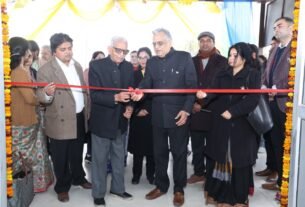The Joint Entrance Examination (JEE) Main is a critical assessment for aspiring engineering students in India, serving as a gateway to numerous prestigious institutions. The JEE Main 2025 examination is set to maintain its vital role in the university admission process, enabling candidates to secure a position in undergraduate engineering programs. With a stringent structure, the exam evaluates students on their knowledge of Physics, Chemistry, and Mathematics, ensuring that only the most adept candidates gain admission to esteemed engineering colleges.
Scheduled to take place on multiple days throughout different months, JEE Main 2025 will follow a predefined timetable, offering candidates the flexibility to choose their preferred date. However, it is crucial for students to accurately select their exam city during the registration phase. This decision not only affects their convenience but also has significant implications given the recent announcement that no changes will be permitted to city allotments post-registration. Consequently, the selection of the correct exam city is vital to avoid last-minute hurdles and ensure a smooth examination experience.
As the examination approaches, candidates should be aware of the implications of strict city allotments. Changes in cities could lead to logistical challenges, exacerbating stress levels during an already demanding period. Therefore, it is imperative for students to carefully evaluate their options and plan ahead. This includes considering factors such as travel time, local accommodations, and accessibility when selecting an exam city. A well-thought-out decision not only enhances the likelihood of performance during the exam but also contributes positively to the overall examination experience. Ultimately, thorough preparation and strategic planning are essential components for success in JEE Main 2025.
Government Regulations on Exam City Allotment : JEE Main 2025
In an effort to streamline the examination process, the authorities responsible for conducting the JEE Main 2025 have implemented strict regulations regarding the allotment of exam cities. Once candidates receive their designated examination city, changes to this allocation are not permitted. This regulation is primarily driven by logistical considerations and the overarching need for effective management of examination centers.
The examination process entails intricate planning and coordination at various levels. When a candidate registers for the JEE Main 2025, numerous factors determine their allocated exam city, including geographical location, availability of resources, and the capacity of centers to accommodate test-takers. By prohibiting changes post-allotment, the examination authorities aim to maintain a structured approach, minimizing confusion and enhancing operational efficiency. Such regulations help to ensure sufficient staffing at each center, prompt distribution of materials, and better preparedness to handle the influx of candidates on the exam day.
Adhering to these newly established rules is significant for candidates, as it directly affects their examination experience. By understanding and accepting the limitations imposed on exam city changes, candidates can better prepare themselves for the logistics of reaching their respective centers. This clarity can alleviate potential anxiety related to last-minute adjustments or relocations, allowing candidates to focus on their studies and performance. Moreover, the implementation of these regulations signifies the commitment of the examination authorities to provide a fair and equitable testing environment for all participants.
In conclusion, the regulations surrounding exam city allotment for JEE Main 2025 serve a crucial role in ensuring efficient management of the examination process. By mandating that no changes are allowed after allotment, authorities aim to enhance the overall experience for candidates, while also addressing key logistical concerns inherent to such large-scale assessments.
Frequently Asked Questions (FAQs) About JEE Main 2025
The Joint Entrance Examination (JEE) Main 2025 has generated numerous inquiries from candidates, particularly regarding the exam city allotment. Understanding these concerns is crucial for prospective applicants to ensure a smooth examination experience.
One of the most pressing questions is what a candidate should do if they are unable to attend the exam in the city they have been allocated. Unfortunately, under the current regulations, candidates who cannot attend in their allotted city must forfeit their exam slot. It is advisable that candidates consider their travel and accommodation arrangements well ahead of time. Proactive planning can alleviate anxiety over unforeseen circumstances that may prevent attendance on the exam day.
Another common query revolves around the rationale behind the no-change policy for allotted exam cities. This decision has been implemented to ensure the logistics of the examination process remain efficient and streamlined. Changing exam cities can lead to complications in resource allocation, security arrangements, and candidate management. Thus, the examination authorities emphasize the importance of candidates selecting their preferred exam city carefully during the registration process.
In light of this, selecting the preferred exam city during the application is crucial. Candidates should consider factors such as proximity, travel costs, and availability of accommodation when making this decision. The registration system typically allows candidates to choose among several cities, based on their convenience. It is essential that candidates complete this section thoroughly to avoid any complications later on.
As the JEE Main 2025 approaches, candidates are encouraged to stay informed and proactive regarding their exam logistics. By addressing these common concerns, prospective candidates can better prepare for the upcoming examination.
Best Practices for Choosing Your Exam City
Selecting the appropriate exam city for the JEE Main 2025 is a critical decision that can significantly impact a candidate’s overall experience on the exam day. To make an informed choice, candidates should consider several essential factors that align with their individual circumstances.
Firstly, distance plays a crucial role in deciding the exam city. Candidates are encouraged to choose a location that minimizes travel time on the exam day. Opting for an exam city within close proximity to their residence can alleviate the stress of potential delays due to traffic or other unforeseen circumstances. Effective planning can also ensure timely arrival, which allows candidates to settle down and mentally prepare before the examination begins.
Accessibility is another vital factor to ponder when selecting an exam city. It is imperative to evaluate the available modes of transportation. Cities with reliable public transport systems or easy access to major highways can provide candidates with peace of mind, knowing they have various options to reach the exam center. Moreover, candidates should familiarize themselves with the local route, which can help mitigate last-minute uncertainties.
Familiarity with the area can also influence a candidate’s performance. Choosing a city where the candidate feels comfortable can help in alleviating anxiety. If possible, visiting the city ahead of time can provide insights into the surroundings, further enhancing the candidate’s confidence. Finally, investigating accommodation options is essential, especially for those traveling from distant locations. Finding nearby hotels or hostels can enhance convenience, allowing for restful nights leading up to the exam.
By considering these factors—distance, accessibility, familiarity, and accommodations—candidates can select an exam city that not only meets their needs but also enhances their overall preparedness for the JEE Main 2025.





